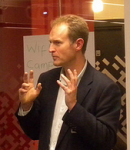I was inspired by Francois Mattaraso’s excellent post on the “theory, policy and practice of arts funding” to go back to my days as an administrator at the Arts Council, during one of the strangest periods of arts funding in the late 90s. Continue reading “Administration and power – a case study”
Category: Uncategorized
Creative clusters
The recent report by Sir Peter Bazalgette has placed a new and welcome emphasis upon the relationship between place and the creative economy. Continue reading “Creative clusters”
Creative-led innovation and growth
The recently published Bazalgette review of the creative industries made much of the importance of creative clusters. But, despite using the term on a regular basis, there was a surprising lack of commentary or policy recommendations relating to the ‘creative economy’. Continue reading “Creative-led innovation and growth”
General Election 2017
Over the year or so leading up to the 2015 General Election, I worked with a couple of colleagues to commission and publish a number of articles by leading commentators on the major issues facing the creative industries. Continue reading “General Election 2017”
Remembering Coventry
Coventry may not quite be Atlantis, but it’s certainly got a sense of being the UK’s lost city. Continue reading “Remembering Coventry”
Abolition of the Arts Council
In reading about Donald Trump’s suggestion that the National Endowment for the Arts should be abolished, I’m reminded of my first visit to 10 Downing Street. Continue reading “Abolition of the Arts Council”
Mainly stories and images
My  work tends to focus on creating collaborations, bringing together people and practices from different disciplines. Mainly it’s design and technology, arts and science – game controllers and microscopes. Continue reading “Mainly stories and images”
work tends to focus on creating collaborations, bringing together people and practices from different disciplines. Mainly it’s design and technology, arts and science – game controllers and microscopes. Continue reading “Mainly stories and images”
Post-Brexit reading
It’s been both a depressing and a fascinating couple of weeks…… Continue reading “Post-Brexit reading”
Popping-up everywhere
Choreographing local creativity
A colleague recently helped set up a creative collaboration between two friends: an architect and a visual artist. It took a couple of years to plot, and a few months to choreograph. It involved getting local permissions — mainly from land and building owners, rather than the local council. And there was plenty of other planning and logistics to ensure that the event — a sound-and-light show between buildings and across a couple of streets in North East London — was safe and fun for whoever bothered to turn up.
2000 people turned up! There was no marketing or promotion — just a flurry of emails and facebook posts a couple of weeks before. But some of these got picked up by local networking sites and a major on-line listing magazine — and suddenly they were inundated. Continue reading “Popping-up everywhere”
Evaluation – proving or improving?
Prompted by a great presentation from Jon Hugget, The Social Innovation Partnership hosted a lively discussion on Evaluation and Social Innovation this morning, organised in partnership with Impact Hub Westminster and °directional thinking.
Starting from the premise that too often evidence just gets in the way of innovation, Jon posited the view that the focus of social innovation should be on ‘Improving’ what we do, not trying to ‘Prove’ the validity of what we are doing.
There was broad agreement that the desire to demonstrate robust evidence can sometimes be a barrier to responsive and engaged social action and innovation – and a range of examples were cited of programmes which have succeeded through a commitment to agile and responsive methods of evaluation and learning while the project is progressing: from driving to primary healthcare, safe sex counselling to early years intervention.
| Proving | Improving |
| Slow | Quick |
| Objective | Subjective |
| Academic | Practice-based |
| Laborious | Responsive |
| Robust | Useful |
| Longitudinal | Immediate |
However, all participants acknowledged the value and importance of evidence, and a strong case was made for investment in data-gathering and of understanding impact over the longer-term. Indeed, the point was made that, although funders and commissioners will often rely too heavily on evidence and data which appears detached from practice, this will assist them in being more adventurous and risk-tolerant than practitioners who might be too close to the action to take risks and countenance failure.
But there was remarkable agreement on the need for a more flexible approach, with a call for a broader, more diverse, approach to evaluation and measuring impact. There was a particular emphasis on the importance of drawing in users and practitioners – to be part of a more interactive evaluation process, based on live, ongoing, experience, rather than just longer-term research. A more radical approach was also suggested – one which might invite users and practitioners (rather than funders and commissioners) to drive the process, and shape the measures against which success is determined.
Ultimately, of course, everyone wants to contribute towards social programmes which are ‘proven’ to make things better for the people they’re trying to support, and no-one wants to waste resources on programmes which fail. But for TSIP, and for other partners, social innovation will always require a more agile and dynamic approach where getting things wrong might actually lead to improvement. Placing evaluation at the heart of that ‘improving’ mindset will ensure that those failures drive future change.
Perhaps characteristically, the group called for a ‘learning’ approach – one in which evaluators shared ideas, and were open about what works and what doesn’t. As the first of a series of breakfast sessions, this meeting provided the starting point for such a dialogue with other sessions to come.









